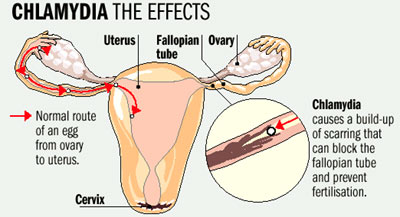Chlamydia is one of the most common sexually transmitted diseases in the world. According to the Center for Disease Control (CDC), 1,422,976 cases of chlamydia were reported to CDC from 50 states and the District of Columbia, but an estimated 2.86 million infections occur annually. A large number of cases are not reported because most people with chlamydia are asymptomatic and do not seek testing.
It is imperative for you to get tested if you are pregnant, as chlamydia poses risks to both the mother and the baby. It can easily be passed to your newborn causing illness and possible tissue damage.

chlamydia during pregnancy : image by women-health-info.com
What is Chlamydia?
Chlamydia infection is a common sexually transmitted disease (STD) caused by the bacterium chlamydia trachomatis. The term ‘chlamydia infection’ can also refer to infection caused by any species belonging to the bacterial family Chlamydiaceae.
The cervix and urinary tract are typically the first targets of chlamydia in women, and if left untreated the infection will spread to other parts of the reproductive system, causing irreversible damage if left untreated. Pelvic Inflammatory Disease (PID) being a prime example, which in turn can cause infertility and damage to the reproductive organs. PID also increases the chance of ectopic pregnancy, because scarred fallopian tubes make it impossible for the fertilized egg to travel down to the uterus. In men, untreated chlamydia can cause epididymitis, which can lead to sterility.
Symptoms of Chlamydia
Chlamydia isn’t known as the ‘silent infection’ for nothing. Most people who have contracted this disease don’t notice any symptoms, and so don’t know they have it. Research suggests that 50% of men and 70 – 80% of women don’t get symptoms at all with chlamydia infection.
For those who do experience symptoms, they may include: pain when you urinate, unusual discharge from the penis, vagina or rectum or, in women, bleeding between periods or after sex.
For the most part however, chlamydia is asymptomatic. If you’re unfortunate enough to have contracted chlamydia, there’s a good chance you won’t know about it until you start experiencing the complications. And during a pregnancy, the embarrassment of getting tested is a small price to pay for your baby’s safety and your peace of mind.
If you do turn out to have chlamydia, don’t be too alarmed. You are not alone, and do take comfort in the fact that the infection is easily treatable with antibiotics specific to pregnancy.
Effects on Pregnancy
Women who have chlamydia during their pregnancy have a greater risk of infection of the amniotic sac and amniotic fluid. Chlamydia can make a pregnant woman more likely to give birth prematurely or even miscarry.
Chlamydia if left untreated can make you more susceptible to HIV and other STIs if you’re exposed to them, it also raises your risk of a uterine infection after delivering your baby.
If you have chlamydia when you go into labor, you could pass the bacteria onto your baby. As your baby passes through the birth canal, she will come into contact with your blood and vaginal fluids. The bacteria are passed through contact with these fluids. Between 20% to 50% of babies born to infected mothers will contract the infection. Your newborn could develop an eye infection called conjunctivitis and some even develop pneumonia a few weeks after birth. In addition, chlamydia can cause your baby to have a low birth weight at birth.
Before and after pregnancy, chlamydia can travel up from your cervix and infect your uterus or fallopian tubes, causing PID. PID can result in permanent damage to your fallopian tubes, and lead to chronic pelvic pain, infertility and an increased risk of ectopic pregnancy if you become pregnant again.
Treatments of Chlamydia during Pregnancy
Pregnant women who are infected will be treated with Erythromycin or Amoxicillin. These antibiotics are usually taken once a day for a full week and will cure 90% of infected mothers. If you have received treatment for Chlamydia, it is a good idea for to have Chlamydia testing again 3 weeks after your treatment, to be sure that your body is rid of the disease.
However, we cannot stress enough the importance of getting tested for sexually transmitted infections prior to getting pregnant – even if you have been monogamous for years. By getting tested for chlamydia, you can prevent your baby from contracting the disease and suffering any physical damage as a result.
Related posts:
1. Ovarian Cyst
2. Ashermans Syndrome



 Saving...
Saving...